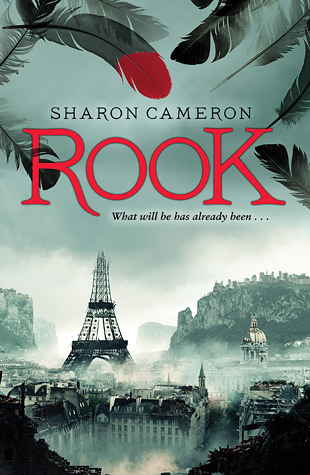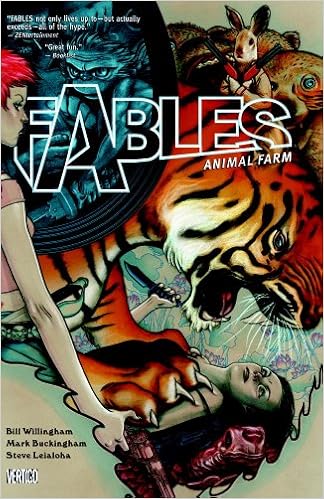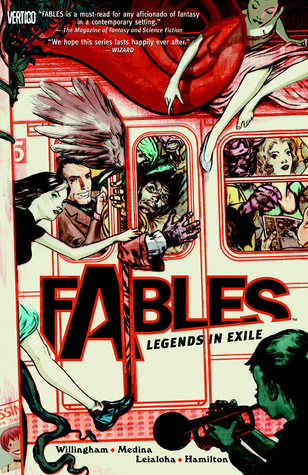 |
| Scholastic Press |
Sharon Cameron
2015
The Summary
"History has a way of repeating itself. In the Sunken City that was once Paris, all who oppose the new revolution are being put to the blade. Except for those who disappear from their prison cells, a single, red-tipped rook feather left in their place. The mysterious Red Rook is a savior of the innocent, and a criminal in the eyes of the government.
"Meanwhile, across the sea in the Commonwealth, Sophia Bellamy's arranged marriage to the wealthy René Hasard is the last chance to save her family from financial ruin. But when the search for the Red Rook comes straight to the doors of the Bellamy House, Sophia discovers that her fiancé is not all he seems. Which is only fair, because neither is she.
"As the Red Rook grows bolder and the stakes grow ever higher, Sophia and René find themselves locked in a tantalizing game of cat and mouse.
"Daring intrigue, delicious romance, and spine-tingling suspense fill the pages of this extraordinary epic tale from award-winning author Sharon Cameron."
The Good
I absolutely loved Rook. I found it at my library purely by accident, sitting atop a display of random young adult novels in the teen section, and I was immediately attracted to the cover. I recognized the image of Paris on the cover, replete with a skeleton of the Eiffel Tower rising in the distance. It looked familiar and yet, at the same time, it was completely and utterly foreign...and I couldn't help myself.
I was immediately intrigued by the Red Rook. Sophia lives an intriguing double life as both the daughter of an impoverished aristocrat and the Red Rook. (I'm not ruining anything for readers by mentioning Sophia's alter ego, as her identity is hinted at on the book jacket and confirmed in the first couple of pages.) She's a clever and capable heroine, who manages to save lives and, ultimately, start a revolution.
Personally, I liked her.
And, while I was a little suspicious of René, I eventually grew to like him. He and Sophia work well together. They both have (possibly deadly) secrets; they have unusual skills that help them fit quite nicely in their line of work; and they make a living thwarting the government. I liked seeing their relationship develop, and I liked seeing how Sophia reacted to someone who had many of the same skills and talents as she.
Granted, I wasn't a fan of the love triangle--René and Sophia seemed to harbor a mutual affection, while Spear and Sophia have history. Although Sophia views Spear as more of a brother, their relationship is, nevertheless, complicated--but it wasn't as bad as, say, Twilight. Or Vampire Diaries. Or Something Strange and Deadly. Or any number of other young adult fantasy/sci-fi romance.
Overall, I liked Rook. It reminded me of Cinder and the rest of the Lunar Chronicles by Marissa Meyer. While it does fall under the rather broad label of dystopian young adult fantasy (think Hunger Games, Divergent, The Maze Runner, Life as We Knew It or, even, The Giver), I really enjoyed Cameron's novel. I enjoyed the characters, the unexpected twists and turns, the ambiguous references to the past, the complicated political climate. It's quickly become one of my guilty pleasures.
The Bad
Admittedly, I did dislike the pace of this novel. For the most part, I enjoyed Rook. I liked the intermingling of tense, suspenseful story-writing with political intrigue and romance, and I liked how the story would flip between characters and give me insight into what's happening at any given moment.
However, I hated how it slowed toward the end of the story. I think Rook was bogged down by too many twists and turns, by too much build up. It would have fared better if it had trimmed out a little of the fluff--the budding romance between Sophia and Rene, the dwelling on LeBlanc's political aspirations, the myriad of preparations to depart for the Sunken City--and focused more on the core of the story.
Also, I would have liked a little more detail about what happened to Paris and society as a whole. I know about the Great Death, which apparently was a near-extinction level event that practically wiped out the human race, and I understood vaguely that the so-called "Ancients" were essentially us; however, I didn't quite understand what happened between the Great Death and the present day of Sophia's world.
One character postulated some theories, such as a reversal of the magnetic poles or a weakening of the atmosphere, which could have led to the change in climate and the gradual decline of humanity, but I don't have much detail. I mean, what happened to Paris that it became the Sunken City? How and why did the Commonwealth build itself into some semblance of Regency era England? What happened that technology was completely and utterly wiped out--and why was it so distrusted?
I would have loved a little more detail, and I was a little disappointed when I didn't find it.
The Ugly
Death.
There's a lot of gruesome ways to die in this book, whether by guillotine or knife blade or poison or simply exposure in prison. Le Blanc and the Allemande, intent on quelling the populace and bringing rebels to heel, leave a trail of bodies in their wake--and it's really quite gruesome when you think about it.









